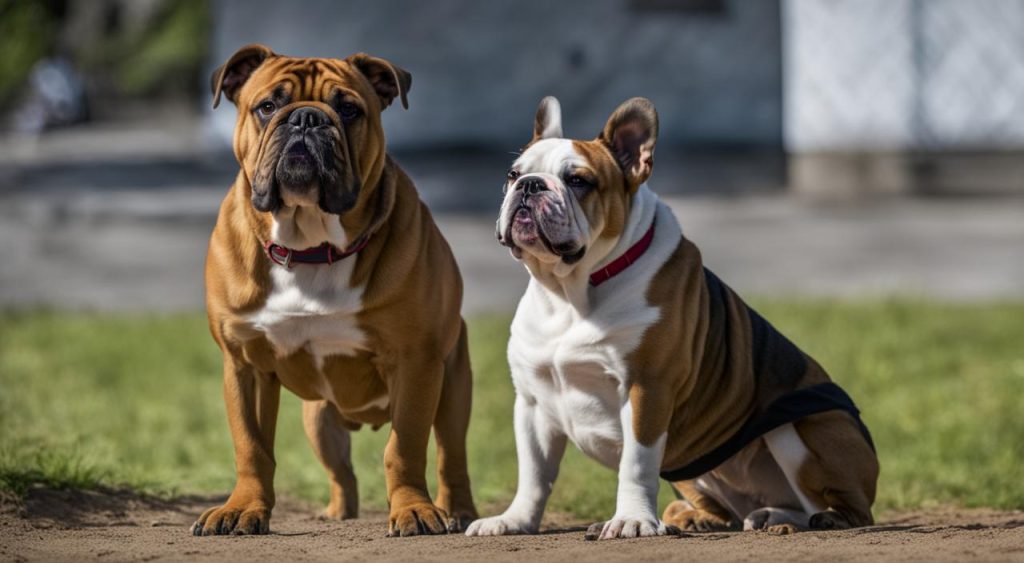Bulldogs are a beloved breed known for their distinctive appearance and endearing personality. However, like any dog breed, Bulldogs have the potential to display aggression if not properly bred and socialized. Understanding the factors that contribute to aggression in Bulldogs can help dog owners better manage their behavior and ensure a safe and harmonious environment.
The breeding history of Bulldogs plays a significant role in determining their potential for aggression. Originally bred for bull baiting, a violent sport that required strength and fearlessness, Bulldogs have undergone a transformation over time. Selective breeding has led to the development of friendly and gentle family pets. While individual Bulldogs may still display aggressive tendencies, the breed as a whole is not known for high levels of aggression based on available data and reports.
It’s important to note that health issues can also contribute to aggression in Bulldogs. Conditions such as hypothyroidism can affect a dog’s behavior and temperament. However, with proper care and management, these issues can be addressed, minimizing the risk of aggression.
When considering Bulldog aggression, it is crucial to understand that early socialization is key. By exposing Bulldogs to various people, animals, and environments in a positive and controlled manner, owners can help shape their behavior and prevent the development of aggressive tendencies. Additionally, positive reinforcement training techniques should be used to reward good behavior and correct undesirable behavior.
Key Takeaways:
- Bulldogs have the potential for aggression, but they are generally not considered to be a highly aggressive breed.
- The breeding history of Bulldogs has transitioned them from being bred for bull baiting to becoming friendly and gentle family pets.
- Health issues, such as hypothyroidism, can contribute to aggression in Bulldogs, but proper care and management can minimize the risk.
- Early socialization and positive reinforcement training are essential for preventing and managing aggression in Bulldogs.
- Selecting a responsible breeder who breeds for temperament and health is important in reducing the likelihood of aggressive behavior.
Breeding and Aggression
The breeding history of Bulldogs is crucial in understanding their potential for aggression. Originally bred for the violent sport of bull baiting, Bulldogs possessed traits such as strength and fearlessness. However, over time, breeders selectively bred Bulldogs to transition them into friendly and devoted family pets.
“Bulldogs were bred for bull baiting, which required them to be strong and fearless. But breeders have worked hard to transform them into loving family pets.”
Despite these breeding efforts, individual Bulldogs may still display signs of aggression. Early socialization is key in preventing and managing aggression in this breed. By exposing Bulldogs to various people, animals, and environments in a positive and controlled manner, their chances of developing aggressive behavior can be significantly reduced.
It is important for Bulldog owners to be aware of the potential signs of aggression displayed by their pets. Some common signs include growling, snapping, lunging, and resource guarding. Recognizing these signs and addressing them early on can help prevent aggressive behaviors from escalating.
Early Socialization and Preventive Measures
Early socialization is essential for Bulldogs to ensure they grow up to be well-rounded and non-aggressive dogs. By exposing them to different experiences, interactions, and stimuli during their puppyhood, they can learn to react positively and appropriately in various situations.
In addition to socialization, there are a few preventive measures that Bulldog owners can take to manage and reduce aggression in their pets. Positive reinforcement training techniques should be employed to reward good behavior and correct undesirable behavior. Spaying or neutering Bulldogs can also help in reducing aggression.
As the owner, it is important to establish yourself as the pack leader and provide consistent rules, boundaries, and structure. This helps prevent Bulldog dominance and promotes a harmonious relationship between you and your pet.
Regular exercise, both physical and mental, is vital to keeping Bulldogs calm and less prone to aggression. Providing them with outlets for their natural energy and instincts, such as regular walks and interactive toys, can help alleviate any frustrations or pent-up energy that may lead to aggressive behaviors.
Overall, with proper breeding practices, early socialization, and responsible ownership, Bulldogs can maintain their friendly and gentle nature. By proactive measures, you can ensure a happy and well-behaved Bulldog that will be a cherished member of your family.
Strategies for Managing Bulldog Aggression
As a responsible dog owner, there are effective strategies you can implement to manage and prevent aggression in Bulldogs. By following these steps, you can ensure that your Bulldog becomes a well-behaved and loving family pet.
Firstly, it is crucial to carefully select a responsible breeder who prioritizes temperament and health during the breeding process. A reputable breeder will strive to produce Bulldogs with stable and friendly personalities, reducing the likelihood of aggression.
Additionally, early socialization plays a crucial role in preventing aggression in Bulldogs. Expose your Bulldog to various people, animals, and environments from a young age in a positive and controlled manner. This will help them develop confidence and familiarize themselves with different situations, reducing the risk of reactive or aggressive behavior.
Positive reinforcement training techniques are highly effective in modifying Bulldog behavior. Reward good behavior with treats, praise, and affection, while consistently correcting undesirable behavior. This approach encourages your Bulldog to learn and understand the behaviors that are expected from them, leading to a well-behaved and non-aggressive pet.
Spaying or neutering your Bulldog can also be beneficial in managing aggression. This procedure helps reduce hormone-related aggression, making your Bulldog more calm and less prone to displaying aggressive behavior.
Finally, it’s important to establish yourself as the pack leader and set clear rules, boundaries, and structure for your Bulldog. This helps prevent Bulldog dominance, which can contribute to aggressive tendencies. Providing regular exercise, such as daily walks and engaging in interactive play sessions, helps channel your Bulldog’s energy and prevent behavioral problems associated with boredom or frustration.
By following these strategies, you can effectively manage and prevent aggression in Bulldogs, allowing them to become cherished members of your family.





